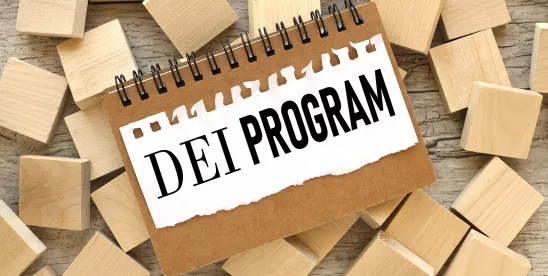Update as of April 4, 2025: Chicago Women in Trades (CWIT) is a non-profit, federally funded organization dedicated to “promoting diversity, equity, and inclusion within the skilled trades industry.” After receiving notices from the Department of Labor to cease all activities related to “diversity, equity, and inclusion” or “diversity, equity, inclusion, and accessibility” (together, DEI) programs, and a notice that all CWIT grants and contracts were being terminated, CWIT filed suit. The United States District Court for the Northern District of Illinois recently published a Memorandum Opinion and Order, enjoining the Department of Labor from: (1) requiring any grantee or contractor nationwide to make any certification or representation pursuant to the Certification Provision of Executive Order 14173; (2) terminating or freezing awards and contracts with CWIT; and (3) initiating any False Claims Act action against CWIT pursuant to the Certification Provision of this Executive Order. Unlike the injunction issued by the United States District Court for the District of Maryland and overturned by a panel of the 4th Circuit Court of Appeals, the injunction pertaining to the Certification Provision applied only to the Department of Labor and, with respect to the Termination Provision and the Enforcement Provision, only as to CWIT. We expect further litigation and will continue to monitor developments.
On February 21, 2025, the United States District Court for the District of Maryland enjoined the Trump administration from implementing two recently issued executive orders targeting diversity, equity, inclusion, and accessibility (“DEI” or “DEIA”) programs. These executive orders, Ending Radical and Wasteful Government DEI Programs and Preferencing and Ending Illegal Discrimination and Restoring Merit-Based Opportunity, sought to eliminate DEIA activities and programs within the federal government, recipients of federal contracts and grants, the private sector, and educational institutions.
Published on January 20 and 21, 2025, among other things, these executive orders (1) directed executive agencies to terminate “equity-related” grants and contracts; (2) directed all executive agencies to include within every federal contract or grant award a certification, enforceable through the False Claims Act, that the recipient of federal funding does not operate any programs promoting DEIA in violation of federal anti-discrimination laws; (3) directing the Attorney General to encourage the private sector to end illegal discrimination and preferences, including DEIA, and to identify potential civil compliance investigation targets (the “Challenged Provisions”).
On February 3, 2025, the National Association of Diversity Officers in Higher Education, the American Association of University Professors, the Restaurant Opportunities Centers United, and the Mayor and City Council of Baltimore, Maryland (collectively, the “Plaintiffs”), filed suit seeking a preliminary and permanent injunction enjoining the government from enforcing the Orders. The Plaintiffs also sought a declaration that the Challenged Provisions are unlawful and unconstitutional.
Scope and Implications of the Preliminary Injunction
In its February 21st memorandum opinion granting Plaintiffs’ request for a preliminary injunction (with a single, narrow exception), the Court found the Challenged Provisions violate the First and Fifth Amendments to the United States Constitution in that they: are unconstitutional content-based and viewpoint-discriminatory restrictions on protected speech (First Amendment); and (2) deny Plaintiffs protection under the Fifth Amendment right to Due Process. Key to the Court’s decision was its finding that the Orders fail to define key terms, including “DEI,” “DEIA,” “equity,” “equity-related,” “promoting DEI,” “illegal DEI,” “illegal DEI and DEIA policies,” and “illegal discrimination or preferences,” or to identify the types of programs or policies the administration considers “illegal.”
The preliminary injunction is broad in scope, prohibiting the administration from:
- pausing, freezing, impeding, blocking, canceling, or terminating any awards, contracts or obligations, or changing the terms thereof, on the basis of a Challenged Provision;
- requiring any grantee or contractor to make any “certification” or other representation pursuant to a Challenged Provision; or
- bringing any False Claims Act enforcement action, or other enforcement action, pursuant to any Challenged Provision.
The Court did not enjoin that part of the Challenged Provisions directing the Attorney General to submit a report containing recommendations for enforcing federal civil rights laws, and to identify potential civil compliance investigations.
Notably, as a preliminary injunction, the injunction will be in place during the entirety of the litigation until lifted by the Court. Additionally, the injunction is nationwide in scope and is not limited to the Plaintiff parties. That said, the injunction does not limit enforcement of other executive orders, some of which also threaten termination of federal contracts and grants and require certification.
What’s Next?
The administration will likely appeal the Court’s decision to the United States Court of Appeals for the Fourth Circuit. The party losing that appeal will likely appeal the decision to the United States Supreme Court. This means that, unless the 4th Circuit orders the District Court to lift the injunction while the litigation proceeds (which is not likely), the injunction will remain in place for the time it takes for a final decision to be reached.
Because the injunction does not prohibit this aspect of the Challenged Provisions, the Attorney General is expected to submit a report that includes the identification of potential civil compliance investigations of publicly traded corporations, large non-profit corporations or associations, foundations with assets of 500 million dollars or more, state and local bar and medical associations, and institutions of higher education with endowments over 1 billion dollars. As per the applicable Executive Order, the Attorney General’s report must be submitted by May 21, 2025.
What Should You Do?
Organizations, including private companies, federal contractors, foundations, associations, and institutions of higher education, should continue to review their existing policies and programs to confirm compliance with current law. In particular, organizations should ensure that all activities and programs:
- Are broadly inclusive and open to all;
- Do not include targets or goals (even those that are aspirational) based on race, gender, or any other protected characteristic;
- Do not tie compensation or other rewards to the achievement of DEIA objectives or goals;
- Do not provide benefits or awards (scholarships, mentoring programs, and the like) based on protected characteristics;
- Do not require organizations to consider diverse groups of candidates for hiring or promotion; and
- Do not require board membership to meet specific diversity goals.
Given the increased legal risk to DEIA programs and activities, organizations should consider conducting this review in concert with their legal counsel, under the umbrella of attorney-client privilege. Following this review and consistent with their risk tolerance, culture, and values, organizations should consider re-framing their DEIA programs and activities as necessary to comply with current statutory, regulatory, and judicial requirements. With this review and re-framing (if necessary or desirable), organizations can help reduce legal risk while remaining consistent with their organizational culture and values.





 />i
/>i

